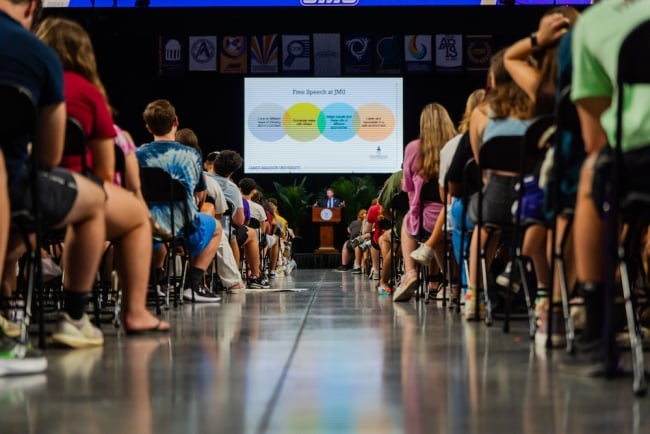You have /5 articles left.
Sign up for a free account or log in.

First-year students gathered in James Madison University’s basketball stadium to learn about free speech on campus.
James Madison University
New student orientation: it’s when students tour their new campus, learn about its policies, make new friends and … debate the ethics of ChatGPT.
At least that’s what happened this year at Denison University, a private liberal arts college in Ohio, where freshmen participated in a live debate ahead of the first day of classes. Students in the crowd were invited to stand and share their arguments about ChatGPT with a facilitator; according to the rules, developed and promoted by Braver Angels, a nonprofit focused on political depolarization, they could not directly address one another but had to respond strictly to the ideas presented.
It marked the second year in a row that Denison staged a debate during orientation; last fall, students engaged in a discourse over free speech restrictions.
“It was just a huge success. The first-year students were lining up at the microphones to do speeches on both sides of the debate. They were asking questions,” said Adam Davis, director of the Lisska Center for Intellectual Engagement at Denison, who noted that a handful of other institutions started offering debates during orientation this year. “We had students who were furiously typing their little speeches on their phone.”
The debate appeared to have a meaningful impact on Denison’s students; in a survey sent to participants afterward, 80 percent of respondents said the exercise “caused them to re-evaluate their position [on free speech] even if they did not change their mind.” Even more said that the debate gave them a better understanding of other people’s viewpoints.
Orientation, once a relatively straightforward opportunity for freshmen to sign up for classes and get to know the campus and each other, now aims to impart a huge array of information that can help new students navigate college. Sessions cover everything from academic resources and financial aid to antihazing training and sexual consent.
To go over all the necessary material, many institutions have had to expand their orientations, turning them into multiday affairs or adding virtual pre-orientation modules to get some of the drier subjects out of the way before students arrive on campus. And in the past few years, it’s become increasingly common for colleges to use the time to bring students up to speed on thorny contemporary issues such as free speech versus hate speech and ChatGPT.
Starting this year, for example, public colleges in Virginia are required to incorporate free speech training into orientation, thanks to a directive from the state’s Republican governor, Glenn Youngkin.
To meet the requirement, James Madison University developed a session in which all 3,185 incoming students watched a video and listened to a series of speakers, then answered questions about free speech via an online quiz game called Kahoot!
David Kirkpatrick, executive director of the Madison Center for Civic Engagement, said the interactive element was designed to help students stay engaged despite the massive amount of information they are asked to absorb during orientation.
“We have gotten a lot of great feedback from students who are grateful to be more prepared for conversations in the classroom and conversation with their classmates,” he said.
Organizations like PEN America have touted orientation sessions on free speech and First Amendment rights as a potential solution to the so-called campus speech crisis, triggered by students who have tried to shut down campus events and speakers they disagree with. They argue that certain speech is so hateful and offensive it should be silenced or punished, though others believe the state of speech on college campuses is more complicated than that.
“We also need to introduce the norms and ideals of free speech to all students through freshman orientation seminars or courses that expose them to the value of freedom of expression and teach them how to uphold it on campus, whether in the lecture hall or while mounting a protest,” Suzanne Nossel, PEN America’s CEO, told a U.S. House of Representatives subcommittee hearing earlier this year.
Getting Oriented to Artificial Intelligence
Sessions about ChatGPT and artificial intelligence appear to be rarer—at least for now. Katie Murray, director for new student and family programs at Towson University in Maryland and the president of NODA, the Association for Orientation, Transition and Retention in Higher Education, said she is aware of at least one institution that briefly touched on the generative AI tool during a mandatory segment on academic dishonesty during its orientation. The segment warned students against claiming work generated by ChatGPT as their own while elucidating other policies on plagiarism and cheating.
The University of San Francisco, a Jesuit institution in California, was one of the rare colleges to offer a full session on ChatGPT this year. At the request of the orientation team, John Bansavich, director of learning technologies at USF’s Center of Instruction and Technology, worked with two rhetoric professors to develop a session on the chat bot that explored the pros, cons and potential ethical issues of using it for schoolwork.
Bansavich said the workshop, which was conducted over Zoom and was not mandatory, focused on talking through the nuances with students, who—according to a poll sent to the participants—had varying degrees of experience with artificial intelligence.
“It wasn’t like we were preaching to them about what they should or shouldn’t do,” he said. But the instructors also wanted to make it clear that not every professor is “going to be using ChatGPT the same way, and you have to be prepared for that.”
Marc Watkins, a lecturer in composition and rhetoric at the University of Mississippi who studies AI literacy, said that orientation could be a difficult time to discuss something as complicated as artificial intelligence with students, who are likely to be overwhelmed by the wealth of information thrown at them.
“It might be a situation where it’s like: this exists, your teachers know about it and they’re going to talk with you about it,” he said.
Murray said she wouldn’t be surprised to see more colleges and universities conduct full-blown sessions on ChatGPT before classes start next fall; orientation trends tend to lag somewhat behind what’s happening in the larger higher ed sphere, she noted.
“As [ChatGPT] became more prevalent throughout the spring semester, I think we were already in the throes of planning for our summer programs, for our welcome programs. So, that academic integrity piece is the easiest place, really, for it to fit right in,” she said. “But as more research is done on AI and ChatGPT, I think we will see … how we are going to utilize that in orientation programming. I would anticipate that it will be a conversation coming up.”





